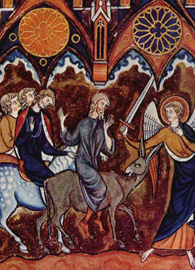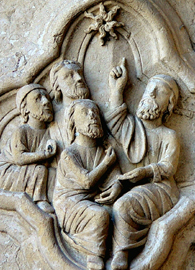Selections From Israel's Story Week 12
Blessings of Balaam: Numbers 22-24
By Sara Koenig
Seattle Pacific University Associate Professor of Biblical Studies
Read this week’s Scripture: Numbers 22-24
16:45

 Enlarge
Enlarge
Many of the Lectios we have read this summer have been either serious or tragic: about God’s anger and punishment, about people who made grave mistakes, about important laws that provide guidelines for holy living. This week’s Lectio, however, has a different flavor — full of humor and irony.
As the last Lectio mentioned, while the Israelites move from Kadesh to the steppes of Moab they are also moving from gloom towards jubilation, and we see that jubilation start in these chapters. There is even a talking animal! Ultimately, this story is one of blessing. This blessing comes from an unlikely place — Balaam, a prophet for hire who was employed to curse the Israelites, but instead blesses them abundantly.
Who Is Balaam?
Balaam is one of the most enigmatic characters in the history of interpretation. On the one hand, the story of his talking donkey seems to poke fun at Balaam, even depicting him on a lower level than his animal. After all, though a “seer,” he is more unseeing than his donkey in his ability to detect the angel.
And he is more beastly than his donkey — he tries to subdue it with his stick whereas it responds with calm, logical speech. In the texts (and interpretations) after Numbers 22–24, Balaam is described as wicked [see Author’s Note 1]. But in these chapters, Balaam is someone who repeatedly expresses his unconditional submission to God’s will. He will not allow himself to be hired without God’s consent (22:8, 12, 18–19). All of Balak’s gold and silver will not sway him from saying only that which God commands him (22:38; 23:12, 26; 24:12–13). By the end of our Lectio, it is clear that Balaam is no mere seer, but is a prophet upon whom God’s spirit rests (24:2).
Balak Invites Balaam
Numbers 22 starts with Moab’s fear about the past, present, and future. Balak, king of Moab, is afraid because of what Israel did to the Amorites in the very recent past: the previous chapter, Numbers 21, told about how the Israelites defeated the Amorites and possessed their land (Numbers 21:21–31).
In the present, Moab is afraid because the Israelites are so numerous (Numbers 22:3), and fears that in the future the great numbers of the Israelites will “lick up all that is around us, as an ox licks up the grass of the field” (22:4). Because of this fear, Balak decides to hire Balaam son of Beor to curse the Israelites, “for I know that whomever you bless is blessed, and whomever you curse is cursed” (22:6).
Already we can see the irony in the truth of Balak’s sentence. Balaam will bless the Israelites, who are — and will be — blessed. Balak’s invitation to Balaam is quite formal, delivered by messengers who also bring money to Balaam. But Balaam asks the messengers to wait: his RSVP must wait until he hears from the LORD what he should do (22:8). It is noteworthy that Balaam refers to God using the personal name Yahweh, instead of the more generic term “God,” Hebrew Elohim (compare 22:13). In 22:18, Balaam refers to God in even more personal terms, as “the LORD my God.” Balaam — a non-Israelite — nonetheless seems to know Yahweh, the God of Israel.
Not surprisingly, God does not give Balaam permission to curse the Israelites, and warns Balaam not to go with the Moabite dignitaries (22:12). Balaam tells Balak’s messengers to return to their own country, specifying that “the LORD has refused to let me go with you” (22:13). However, when the messengers report to Balak what must have been obvious, that Balaam refused to come with them, they leave God out of the message (22:14).
Then Balak tries again, with officials more numerous and distinguished than the former ones! As mentioned before, Balaam tells them that even if Balak were to give him all the riches of his house, Balaam would not be able to do anything large or small against the word of God. And as with the previous officials, Balaam tells them to wait until he hears what God will say. Numbers 22:20 recounts God’s message: “If the men have come to summon you, get up and go with them; but do only what I tell you to do.” So Balaam gets up in the morning and goes with them.
God’s Anger Burns
Then, Numbers 22:22 tells us that God gets angry at Balaam’s going — literally, God’s anger burned, the same phrase that occurred in Numbers 11:1 and 33. Didn’t God give Balaam permission to go two verses previously?
There are a number of explanations given for this conundrum. We should start by remembering that when Balaam first told God about the invitation to go to Moab, God told him not to go (22:12). Some see that even by asking a second time, to learn “what more” God would say to him (22:19), Balaam assumed a lack of constancy with God.
The rabbis saw in this verse an example of how God interacts with human free will: God allows someone to go in a way he wants — that is, God allows Balaam to go to Moab — even if it is not what God wants. But even though God said Balaam could go, his going makes God angry. Some see in Balaam an eagerness to go to Moab, as evidenced by the description that he left (immediately?) after he got up in the morning (22:21). They argue that the eagerness to leave indicates his eagerness to curse Israel, which would arouse the anger of God.
Balaam and God’s Messenger(s)
Regardless of the explanation for God’s anger, without it we would not have what follows: because God is angry that Balaam is going to Balak, God places a sword-bearing angel on the road. While Balaam is riding along, it is the donkey — literally, a she-donkey — who sees this angel (22:23) and veers aside. But though the angel has a drawn sword in his hand, it is Balaam who uses his stick to beat his donkey (22:27).
The road narrows to a path with a wall on either side (22:24), so the second time the donkey attempts to avoid the sword wielding angel, we read that Balaam’s foot gets scraped against the wall so Balaam beats the donkey again (22:25). Finally, the road becomes so narrow that the donkey cannot turn aside, so she just stops and lies down. The text uses the very same language to describe Balaam’s anger (22:27) as it did God’s (22:22), and Balaam beats the animal a third time.
Then, we read that God opened the donkey’s mouth, giving her the power of speech! This description offers us more humor and irony as it plays on Balaam’s gifts — God also uses Balaam’s mouth as the vehicle for God’s message (22:38; 23:5, 12, 16). The donkey’s first question is a reasonable one, but Balaam’s response shows both the reason for his anger (the donkey made a fool of him) and the impetuous level of his anger (“I wish I had a sword in my hand! I would kill you right now!” (22:29)). Of course, we — and the donkey — know that one is very present who has a sword, but Balaam is still quite unaware of that.
Amusingly, the donkey continues to rebuke Balaam using a point that is so justifiable that Balaam cannot help but answer in agreement (23:30). It is at this point — after Balaam has “seen” that the donkey is right — that God intervenes and uncovers Balaam’s eyes so he can literally see the angel of the LORD with his drawn sword. Most times when humans encounter angels in the Bible, their fear is recorded. Though Balaam’s fear is not explicitly described here, he responds by bowing down so low that his face (literally, his nose) touches the ground.
The humor continues when the angel starts with the same question the donkey asked in 22:28, illustrating that, indeed, the donkey was also a messenger of God. “Three times” gets repeated in verses 32 and 33 as the angel emphasizes Balaam’s foolishness: though Balaam felt so foolish he wanted to kill the animal, she was actually protecting him from being killed by the angel. In 22:34, the mockery of Balaam lets up a bit; he responds as he should by admitting his wrong.
Still, we see some irony in Balaam’s admission that “I did not know,” which contrasts with his claim that he is the one who “knows the knowledge of the Most High” (24:16). The angel, who acts and speaks as God’s surrogate, repeats what Balaam has heard before: he can go, but must say nothing except what he is told (22:20, 35).

 EnlargeBalaam Blesses Israel
EnlargeBalaam Blesses Israel
The action then shifts from Balaam, his donkey, and God’s angel to Balaam and Balak, who meets Balaam at the border of his territory and greets Balaam by asking why he didn’t come earlier. Balaam essentially dismisses Balak’s question and emphasizes again that he can only say what God puts in his mouth (22:38).
Then Balaam is brought up to a place called Bamoth-baal’, from where he can see part of the people (22:41). After some ritual sacrifices, Balaam’s first oracle commences as he speaks the exact words that God has put in his mouth. This oracle recounts the events we have read about: Balak brought Balaam to curse Israel, but when Balaam saw them from the tops of the mountains he realized from their strength and numbers that God had no intention of cursing them. Instead, he would be happy to end up like them (23:10)! At this point, the blessing is merely implied by the description of Israel’s numbers and potential.
Still, Balak understands this as a personal affront, asking in 23:11, “what have you done to me?” And the Hebrew uses the verb “to bless” twice in Balak’s speech, berakhta barekh, so it could be translated, “to bless you have blessed them,” or “you have abundantly blessed them!” Balaam makes no apologies for his failure to curse Israel. Instead, he repeats that he can say only what God puts in his mouth (23:12).
Immediately, Balak moves him to another location, the summit of Mount Pisgah, where again Balaam can see only part of the Israelites. Apparently, Balak believed that God might change God’s stance towards Israel, but in this second oracle God (through Balaam) instructs Balak that God will not change God’s mind. God made promises to Israel, and God will keep those promises. God is with Israel, and will not depart from them.
God has blessed Israel, and nothing that Balaam can do will revoke that blessing. Numbers 22 began by using the metaphor that Israel was like an ox that would lick up the Moabites like grass (22:4), but now Israel is compared to a lion that will not “lie down until it has eaten the prey and drunk the blood of the slain” (23:24).
Upon hearing this, Balak — understandably! — tries to stop Balaam from speaking, intimating that if Balaam cannot curse the Israelites, he should at least stop blessing them (23:25). Balaam responds again with what he has said before, reminding Balak that he does what God says.
Balak responds with an almost plaintive comment: “perhaps it will please God that you may curse them for me there” (23:27). Gone is any certainty that Balaam will curse the people, in contrast with Balak’s previous command in 23:13, “curse them for me!” Balak is starting to reckon with the power of the God of Israel. Still, he seems to remain hopeful, and takes Balaam to a third location. Though again the oracle is preceded by sacrifices, there are some new elements.
- First, Balaam does not even bother to look for omens.
- Second, Balaam is now able to see all of Israel, “tribe by tribe” (24:2).
- Third, this time the spirit of God comes upon Balaam (24:2). The assumption is that instead of seeking God by night in a dream (22:9, 20) or having God’s words put in his mouth (23:5, 16), now Balaam is invested with the divine spirit — the mark of a prophet (compare Numbers 11:25–29).
This third oracle starts with Balaam’s introduction of himself as one who is aware of God’s direct revelation (24:3–4). He then compares Israel with well-watered trees and gardens (24:6–7), whose king is more powerful than Amalek’s Agag [see Author’s Note 2], and whose divinely given strength — again, likened to a lion — will crush all its enemies (24:8–9).
This oracle is the climactic one of blessing. In the first oracle, only God determines blessing and curse (23:8). In the second oracle, God’s blessing could not be revoked (23:20). In this oracle, those who bless or curse Israel will themselves be blessed or cursed (24:9).
Now it is Balak’s anger that is kindled (24:10), and he fires Balaam (24:11). Balaam again dismisses Balak’s offer of material gain, and repeats that he is but a spokesman of God (24:13). Then, in his fourth oracle, Balaam not only blesses Israel but directly curses Moab and other nations by prophesying their future destruction (24:15–24). The entire dramatic, humorous, and ironic narrative ends in a very anticlimactic way, with the final verse of Chapter 24 simply describing the departure of Balaam and Balak.
But the prophesies given by Balaam, especially in the third and fourth oracles, will come true in Israel’s glory period under the leadership of Saul and David — the latter, especially, understood as the “star” (24:17) who will conquer Moab (2 Samuel 8:2) and Edom (2 Samuel 8:14).
These texts also illustrate God’s control over other nations, even using the words of a foreigner to bless God’s chosen people. And, ultimately, this account gives the resounding affirmation of a promise made to Abraham that the one who would curse his descendents would be cursed, and that they would be blessed (Genesis 12:2–3). Indeed, as Balak said, Balaam did nothing but bless them.
Questions for Further Reflection
- After reading Numbers 22-24, how do you assess Balaam? If you haven’t already done so, read the texts referenced in the author’s first note; does your assessment of him change after doing so? Why or why not?
- Look again at the content of Balaam’s blessings. How, specifically, does Balaam bless Israel?
- These chapters confirm that God often uses unlikely sources to speak truth and blessing into our lives. Reflect on an example of this in your own journey of faith.

This work is licensed under a Creative Commons License.





The Old Testaments seems to have a few other mysterious characters. For example, who is Melchizedak to whom Abraham gave a tithe? Who is Jethro the Medianite priest and Moses’ father-in-law? Do you have short answers?
Peter Tam
SPC ’71
@Peter: The short answer is that they are indeed a bit mysterious. Scholars have varying opinions about both men, but particularly Melchizedek. You can check out what Dr. Frank Spina said about the two in our Genesis/Exodus series from last fall: https://spu.edu/lectio/exclusive-election-and-inclusive-purpose/ and https://spu.edu/lectio/survival-in-the-wilderness/. Melchizedek is especially interesting because of the references made to him in Hebrews. What do you think about these two?
I am troubled about the later comments about Balaam cited in author’s note 1. How are these justified given Balaam’s (eventual) fidelity in the current passage? Do we assume that Balaam later diverged from allegiance or communion with God and that this didn’t get recorded? I am asking this question particularly because I am already troubled about the fact that Moses, after a lifetime of wise and humble service to God, makes a rather subtle mistake and is exiled from reaching the promised land. I don’t want to see the God of the Old Testament as punitive over trifles, but it’s difficult at time. Please comment. Thanks, Nancy
It’s the lack of character in today’s world that has left us in the shape we are in. When we fall victim to the entitlement trap liberty is lost.
Joel Mitchell
Publisher
http://prysmspress.com